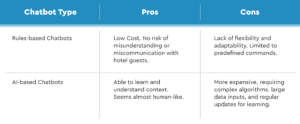
AI chatbot technology has become a new normal in hospitality. Hotel chatbots are able to communicate with guests across multiple channels, including the hotel’s website, Facebook Messenger, WhatsApp, and other communication channels.
They’re able to instantaneously provide answers to commonly asked questions and handle room reservations, check-ins, and check-outs. Hotel chatbots can also field requests for room service and housekeeping, and suggest additional amenities that guests may be interested in – all personalized to guests’ preferences and past behaviors.
In other words, hotel chatbot technology works tirelessly behind the scenes to ensure guests have everything they need, and they can help take substantial weight of the customer service duties off of the hotel staff’s shoulders.
But how exactly does this technology work? Just how beneficial is chatbot technology for both hotels and their guests?
In the simplest terms, a hotel chatbot is like having a personal concierge on your smartphone. However, instead of an actual person, you’re communicating with a sophisticated piece of software programmed to understand and respond to various customer inquiries.
The application of these advanced technologies has become increasingly common in hotels and other hospitality applications around the world. This is largely due to their ability to assist customers and streamline basic operational processes. For example, they can manage simple tasks like booking reservations or providing information about amenities without human intervention—allowing hotel staff members to focus on higher-value tasks that require a personal touch.

When we think about the future of customer service in hotels, two key players come to mind – rule-based chatbots and AI-based chatbots. Rule-based chatbots are set up to answer specific questions based on predetermined rules or scripts.
Alternatively, AI-based chatbots are powered by artificial intelligence technologies such as natural language processing (NLP). In turn, they can understand more complex requests and learn from interactions over time.
In comparing the two, let’s analyze their respective advantages and disadvantages.
The more traditional choice for hotels is the rule-based chatbot. They’re built on a set of predefined rules and they respond based on specific commands from users. This set-up means rule-based chatbots lack flexibility — if a guest asks something outside their programming, these bots can’t give an accurate response.
The upside? Rule-based bots are cost-effective, making them great for smaller hotels or those just starting with automation. Plus, since you define all possible interactions upfront, there’s less risk of misunderstanding or miscommunication.
AI-driven chatbots learn as they go along. With natural language processing (NLP), these clever little machines can understand context within conversations — making them seem almost human-like.
Because of this, however, implementation is trickier. AI-driven chatbots require complex algorithms and vast amounts of data input at the start.
The type of data needed will depend on the intended purpose of the AI chatbot. For example, if an AI chatbot is designed to answer common guest questions about a hotel’s property, it first needs to be populated with the relevant information in order to be of use. Such data can be sourced from FAQs and customer service conversations.
In another example, an AI chatbot for an international business travel hotel will need to be fed with multilingual data prior to starting to ensure that guests of all languages and nationalities can communicate with no difficulties.
It’s important for hotels to make sure that their AI chatbot is able to be properly integrated with existing property management systems and customer relationship management so that they can provide accurate responses to users.
AI-driven chatbots also require regular updates after installation in order to keep their learning up-to-date.

As more businesses optimize for staff efficiency and prioritize better delivery of guest service, AI-based chatbots are quickly becoming a major factor in hospitality. Let’s look at why hotels are embracing this technology over rule-based chatbots, alongside the specific benefits they provide.
An IBM report shows that implementing chatbot technology can cut customer service costs by up to 30%. But it’s not just about cost-saving; these bots provide round-the-clock help, answering guests’ questions promptly no matter what time zone they’re in.
Bots give front desk staff extra breathing room to handle more complex guest needs personally. In turn, this technology makes sure staff attention isn’t split between answering routine inquiries and providing high-quality personalized service.
Many hotels cater to guests from around the globe – language shouldn’t be a barrier for guest service. That’s where multilingual chatbots come into play: they fix communication issues instantly by understanding and responding in multiple languages, making every guest feel at home.
A hotel chatbot can handle guest requests for room service and housekeeping — allowing guests to order food, drinks, and other amenities without having to call the front desk. Not only can THEY respond to guest requests instantly, thereby reducing the time it takes for guests to receive their orders, but THEY can also follow up with guests after their order to receive feedback to improve the guest experience.
Tech-savvy customers appreciate personalized experiences – even when it comes down to promotional offers. Research from Epsilon shows that 80% of consumers are more likely to place a purchase if the experience is personalized to their preferences. Chatbots use customer data to suggest relevant upsell opportunities, improving guest experience and boosting hotel revenue.

It’s more and more common to see AI chatbots for hotels and hospitality businesses. They can offer a more personalized experience compared to booking websites, which is why they are becoming increasingly popular in the hospitality industry.
In order to develop a solution specifically suited for their requirements, hotels sometimes work closely with software suppliers to produce in-house chatbots that are custom-tailored to their needs.
The following are two current examples of in-house hotel chatbots that are being used in the hotel industry today:
These in-house chatbots are designed by working directly with a chatbot software provider to create a custom-tailored solution for the hotel or hotel businesses needs.
Many other chatbots are plug-and-play templates that have the capability to be integrated with and used by many different hotels. Some examples of these include:
Based on the above examples alone, chatbots offer tremendous value in helping hotels automate instant and personal communication with guests, thereby increasing the volume of reservations and reducing the number of abandoned bookings.
AI chatbots are a game-changer for hotels — but these digital wizards don’t operate without robust network infrastructure to support them. Hotel chatbots need strong WiFi to work their magic.
Chatbot technology in hospitality is as much about quality WiFi solutions as it is about artificial intelligence algorithms. Just like your guests can’t enjoy Netflix without stable internet, chatbots also falter with weak connectivity. In other words, the strength and reliability of your hotel’s WiFi network are just as crucial as the sophistication of your chatbot software.
A world-class managed network solution, such as that provided by Blueprint RF, ensures that your hotel’s tech-friendly initiatives don’t fall flat due to poor connectivity. With uninterrupted high-speed internet access and a single architecture that is configurable to fit the specific needs of your property, Blueprint RF’s DG2 managed WiFi platform is engineered to provide the solutions your hotel needs to support hotel chatbot technology.
Learn more about Blueprint RF’s hotel network solutions, and contact us today.